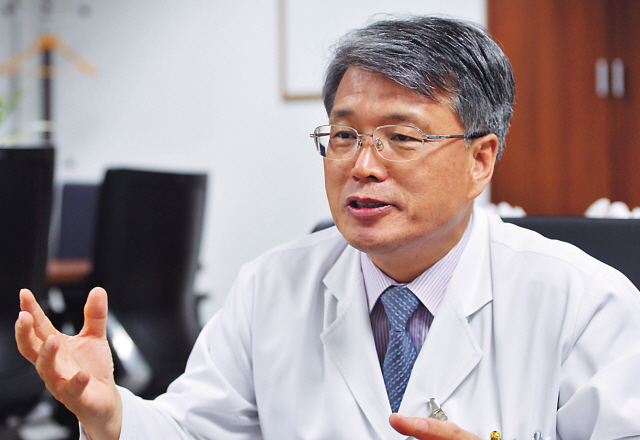Koh Young-cho, a neurosurgeon at Konkuk University Medical Center, has been treating neglected people for 35 years. At the age of 59, Koh is still passionate about seeing patients from three nonprofit clinics in Seoul for the destitute, the homeless and immigrants
“The joy of helping others is so exhilarating that you even feel rejuvenated,” he told The Korea Herald.
Growing up in a devout Catholic family, he had wanted to become a cleric and attended a clergy school for five years.
 |
Dr. Koh Young-cho, a neurologist at Konkuk University Hospital, speaks during a recent interview at his office in Seoul. (Lee Sang-sub/The Korea Herald) |
In his final year of high school, his curiosity for a broader education led him to transfer to a regular high school, from which he prepared to enter medical school.
“If a cleric is someone who treats your soul, a doctor is someone who treats your body. It is a job most similar to a cleric.”
Although he had never studied in depth for the entrance examination, his background in Latin provided him with advantages in English and German, and just within a year of preparation, he entered the nation’s most prestigious medical school, Seoul National University College of Medicine.
“I think I was prepared by God to become a doctor. Indeed, nothing but a miracle would have made it possible for a clergy-educated student to enter Seoul National University College of Medicine within a year of studying. So I am merely repaying what God has given me.”
While he was still in university, he joined the Catholic Student Union and participated in weekend medical volunteering. During this time, he visited the underdeveloped areas of Seoul and Gyeonggi Province to treat the urban poor, the homeless and the evicted.
“Every weekend, I would take a medical box and visit the rural areas of Seongnam or Yangpyeong. Back then, those areas did not even have electricity, not to mention a hospital.”
During this time, he was discovered Jeonjinsang Clinic, a relationship that would last for more than three decades. The clinic was established under the guidance of the late Cardinal Kim Sou-hwan, a life long mentor of Koh, as a part of Association Fraternelle Internationale.
There are now two other nonprofit clinics Koh works at, but Jeonjinsnag Clinic is where his spirit resides.
“Most students stop volunteering after they finish their military service, but the memory of exhilarating joy made me come back.”
The two other clinics where he volunteers are Joseph Clinic and Raphael Clinic, both of which were also projects of Cardinal Kim Sou-hwan.
Joseph Clinic treats the homeless and charity patients and Raphael Clinic treats immigrant workers, all of who have limited access to proper medical care.
When he first started working for these clinics, there were many obstacles. The number of doctors available was insufficient and the patients’ attitudes often didn’t help their treatment.
Aside from being a capable doctor, Koh has a talent for “fishing.” People around him refer to him as “a fisherman who catches doctors.” Whenever the clinics were short of doctors, Koh was most eager to encourage his colleagues to come with him, at least just once.
“I know volunteering is not something one can do just by being forced to. But once they taste the joy of treating someone only they can, it is likely they will continue without me.”
The question often rises: Where does Koh find the energy and motivation to treat patients at three clinics while being the head of a major hospital in Seoul?
Koh said he finds his motivation from others around him who are equally dedicated to helping the neglected and sharing God’s grace.
“When I first started working for Jeonjinsang Clinic, the passion of AFI workers touched me. In those clinics, I’m not the only one who volunteers, everyone does. There were doctors before me like doctor Seonu Gyeong-sik who founded Joseph Clinic. When I see those people and feel the familiar warmth of those people, my fatigue disappears; it is like a synergy effect.”
Koh also had personal pride in his years of dedication. During the interview with The Korea Herald, he proudly presented an appreciation plaque given to him by Cardinal Kim.
“To receive such a meaningful thing from someone you look up to has certainly encouraged me and reaffirmed my commitment.”
Last July, President Lee Myung-bak awarded Koh the Civil Merit award. However, the award does not seem have changed Koh’s dedication in sharing his talent with the underprivileged. To Koh, treating the underprivileged is not something extraordinary.
“I would like to continue helping the neglected of the society until the very end. When I get older and can no longer do an operation, I can still make a diagnosis. Being a doctor is truly a blessing.”
By Kim Jung-ho, Intern reporter (
jungho1991@gmail.com)








![[Today’s K-pop] Blackpink’s Jennie, Lisa invited to Coachella as solo acts](http://res.heraldm.com/phpwas/restmb_idxmake.php?idx=644&simg=/content/image/2024/11/21/20241121050099_0.jpg)